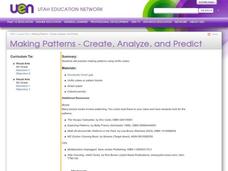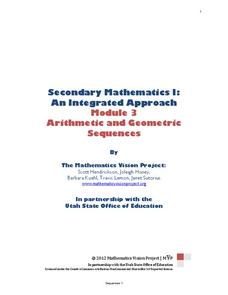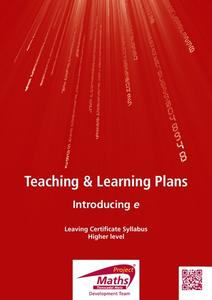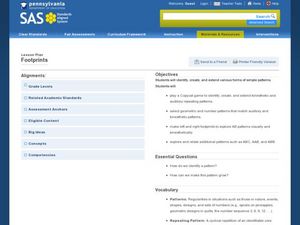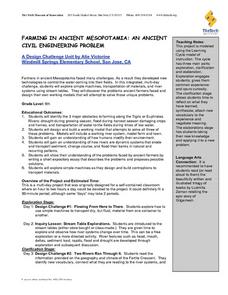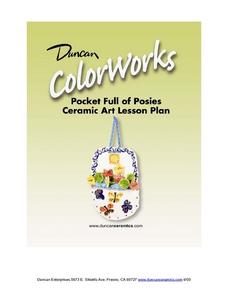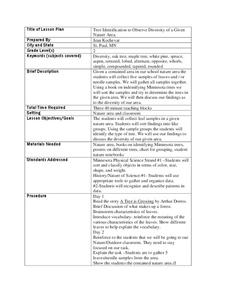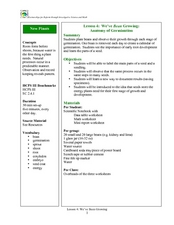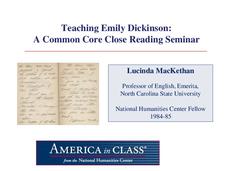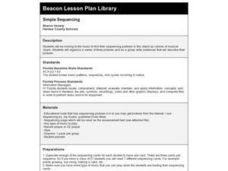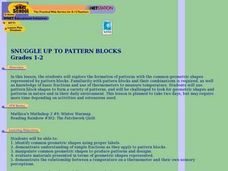University of Colorado
Patterns and Fingerprints
Human fingerprint patterns are the result of layers of skin growing at different paces, thus causing the layers to pull on each other forming ridges. Here, groups of learners see how patterns and fingerprints assist scientists in a...
Curated OER
Making Patterns - Create, Analyze, and Predict
Fourth graders practice making patterns using Unifix cubes and identify, analyze, and determine rules for describing numerical patterns involving operations and nonnumerical growing patterns. They also find an example of a pattern in...
Mathematics Vision Project
Module 3: Arithmetic and Geometric Sequences
Natural human interest in patterns and algebraic study of function notation are linked in this introductory unit on the properties of sequences. Once presented with a pattern or situation, the class works through how to justify...
Curated OER
Representing and Extending Patterns
Learners explore repeating and growing patterns. In this patterns lesson, students describe patterns, explore changing patterns and match patterns. Learners participate in online activities and read books that show patterns in nature and...
Curated OER
Changing Energy: Landforms and Dance
Third graders choreograph a dance to represent the changes in nature. In this dance and nature lesson plan, 3rd graders use sharp quick movements to demonstrate changes.
Curated OER
Visual and Number Patterns
Fourth graders develop strategies for identifying geometric and number patterns. In this mathematical patterns lesson, 4th graders use pattern blocks to make repeating patterns with numbers and shapes. Students then explore number...
Project Maths
Introduction to e
First there was pi and now there's e. A discovery-based lesson helps learners find a pattern in compound interest as the compounding period changes. Their investigation results in the discovery of the number e. The lesson is the first in...
Curated OER
Life Cycle of Trees
Turn your students into young tree-tectives with this fun science investigation into the life of trees. To begin, a class volunteer gets dressed up in a tree costume as the different parts of trees are introduced. Then, the class learns...
Curated OER
Footprints
Students explore patterns. In this patterns geometry lesson, students identify and extend patterns including body parts, movement, geometric shapes, noises, and footprints. Students create and share an original pattern.
Curated OER
The Climate Change Skeptic's Argument: Natural Solar Cycles or Human Activity?
Teachers explore patterns in sunspots and total solar irradiance to understand the counterpoint to the human effect of global warming. In this professional development tool, teachers work through a lesson on the sun's natural patterns to...
Mathematics Vision Project
Quadratic Functions
Inquiry-based learning and investigations form the basis of a deep understanding of quadratic functions in a very thorough unit plan. Learners develop recursive and closed methods for representing real-life situations, then apply these...
Curated OER
Farming in Ancient Mesopotamia: An Ancient Civil Engineering Problem
Sixth graders identify the major obstacles in farming in Mesopotamia. They work together to design and build a model that solves these problems. They write a short essay that describes the problems and their possible solutions.
Virginia Department of Education
Weather Patterns and Seasonal Changes
Get your class outside to observe their surroundings with a lesson plan highlighting weather patterns and seasonal changes. First, learners take a weather walk to survey how the weather affects animals, people, plants, and trees during...
Curated OER
Applied Science - Science and Math Pre Lab
Students find Fibonacci sequences. In this applied Science lesson, students solve Fibonacci sequence problems. Students explore the mathematical patterns of objects in nature.
Curated OER
Pocket Full of Posies: Ceramics
After studying the plant or flower life cycle, have the class create a basket of flowers out of clay. They hone their ceramics skills while they push, pull, then paint clay to look like flowers they've seen in nature. There are several...
Curated OER
Tree Identification to Observe Diversity of a Given Nature Area
For this tree identification lesson, 2nd graders read A Tree is Growing, discuss what makes up a forest, brainstorm characteristics of leaves, gather samples of leaves and examine their samples. Students will sort leaves and compare them...
Captain Planet Foundation
Rotting Away
What happens at the end of a plant's life cycle? Show kids the natural way that plants show that they're decomposing, as well as the importance of compost, with a lesson about living organisms. After reading Log Cabin by Anne Schreiber,...
Curated OER
We’ve Bean Growing: Anatomy of Germination
Students identify the main parts of a seed. In this biology lesson, students explain the factors needed for the seed to grow. They record observations everyday and report findings to class.
Howard Hughes Medical Institute
Survival of the Fittest - Variations in the Clam Species Clamys sweetus
It's not often that you come across a clever laboratory activity that is both imaginative and comprehensive! Using M&M's and Reese's peanut butter candies to represent two different clam species, young biologists test for "relative...
K12 Reader
From Nomad to Farmer
The gradual evolution of the earliest settlers in North America from nomads to farmers is the subject of a reading comprehension learning exercise that asks kids to answer a series of questions using information provided in the reading...
National Humanities Center
Teaching Emily Dickinson: A Common Core Close Reading Seminar
Three of Emily Dickinson's poems, "I like to see it," "Because I could not stop for Death," and "We grow accustomed to the Dark," provide instructors with an opportunity to model for class members how to use close reading strategies to...
Curated OER
Alternative Snowflakes
Students discover how snowflakes in nature are really formed, and recreate this process with paper and glue.
Curated OER
Simple Sequencing
Fourth graders play a stand up version of musical chairs to find their sequencing partners. In this music and language arts lesson, 4th graders enjoy a game that requires them to organize a series of three pictures, then write sentences...
Curated OER
Snuggle Up To Pattern Blocks
Students view and discuss a video about the use of pattern block shapes to form pictures. They, in groups, form garden and quilt designs using pattern blocks and then decorate the room with their art.



